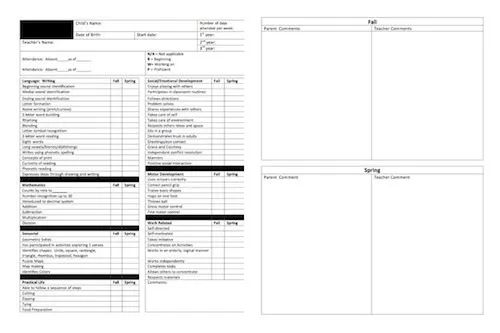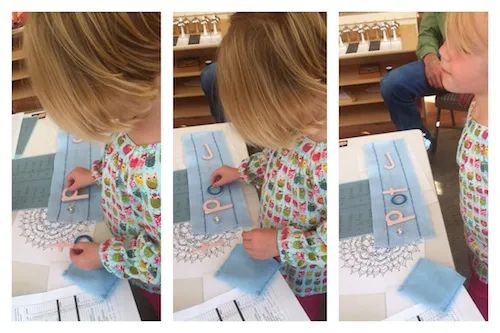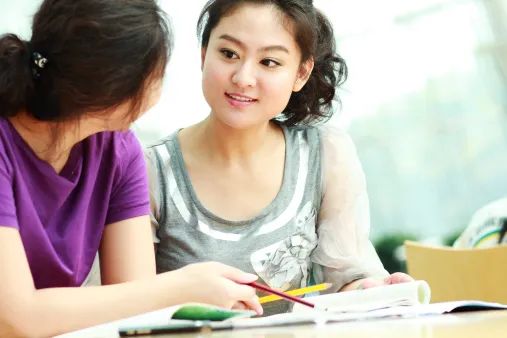Montessori Parent-Teacher Conference: A Parent's Perspective
I remember our first time walking into a parent-teacher conference, not sure what to expect. Both my husband and I were shocked to see a full-page “report card.” Our child was barely 3. I didn’t know if I should feel proud or very worried that our child was already being “graded.” On the contrary, I remember a huge sense of connection—to the teacher, my child, and her school.
 The status report provides an update on all the areas of language, math, sensorial, practical life, social/emotional development, motor development and work related. In addition, both teacher and parent comments are captured during the conference.
The status report provides an update on all the areas of language, math, sensorial, practical life, social/emotional development, motor development and work related. In addition, both teacher and parent comments are captured during the conference.

At our child’s Montessori school, there are both fall and spring parent-teacher conferences. The fall sets a baseline of where your child is, while the spring provides insight on the progress your child has made. The conference report, aka "report card," is essentially a guide for both parents and teachers to come together, get on the same page, and see how your child is doing (what their interests are, where they are thriving, etc.). Because we are all working as a team, the conference provide a great touchbase.
We recently had our fall parent-teacher conference. Having been through this before the previous year, we were more excited and ready to learn where our daughter was progressing and where there may be concerns. Unfortunately, we didn’t have childcare and both of us as parents wanted to attend. So, we brought both of our children with us, which the teachers, thankfully, graciously welcomed.
 Chapin focused on word building,
Chapin focused on word building,
proud when she completed "P-O-T."

Much to our surprise, our daughter picked up a word-building lesson and began to demonstrate how the lesson worked. She built word after word: pot, dog, jar, cat… She would say the word, “Puh…Pot” or “Duh…Dog,” emphasizing the first letter phonetically. Her teachers sat across from us, and said, “This is honestly the best parent-teacher conference I’ve ever been a part because you are able to see for yourselves what lesson she has been doing.” They had planned to tell us about word building, but nothing would quite have captured the meaning behind the lesson or our child’s enthusiasm had she not been right there to demonstrate. Her teachers informed us that Chapin was very interested in language, while not showing as much interest in math. They weren’t concerned, and in fact, gave us ideas to incorporate more language building at home.
What to expect during a Parent-Teacher Conference?
During those 30 minutes, both the teachers and parents may both feel overwhelmed because there is so much information to cover in such a short amount of time. The purpose of the time is to capture your child’s progress over the course of the year, raise awareness to any issues at hand, talk about areas of concern, and discuss ideas on how to improve, and in our case, often we talk about how to extend the learning at home.
Because parents play such a vital role in the education of their children, it is important for everyone—parents and teachers—to be on the same page. As the parent, here are some things to keep in mind when you go into your own Parent-Teacher conferences:
- Keep an open mind—knowing your goal is to have a thriving, healthy, happy child in her classroom.

- Be ready to listen. There will be good news, and there may be areas of concern. This is not because you are a bad parent.
- Take notes. Likely, the teacher will provide some sort of report. However, you might want to jot down notes, e.g. things you can do at home to enhance where your child is in the classroom.
- Allow the Montessori teacher to explain what she is seeing in your child (behavior, skills, challenges, etc.)
- Ask questions. Don’t be afraid to ask the teacher questions—e.g. describe a lesson you may not be familiar with, what interventions have been used for issues that may be going on, what strategies to use to work with your child, or how to incorporate where your child is with your home.
- Talk with your child about what they are doing in the classroom or school. Find out what lessons they are working on, and ask them about those lessons.

Most of all, we’ve learned that the communication between our children’s teachers, administrators, and us as parents is key to success for our child. Whether you have formal parent-teacher conferences or simply exchange emails or phone messages, it’s important to remember to be on the same page and work as a team!




















